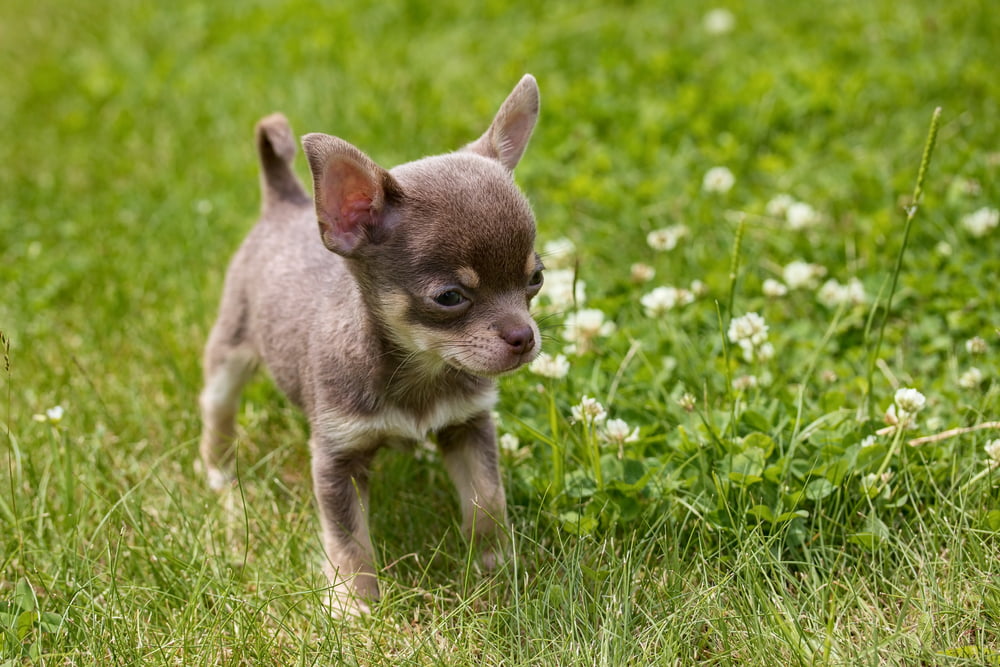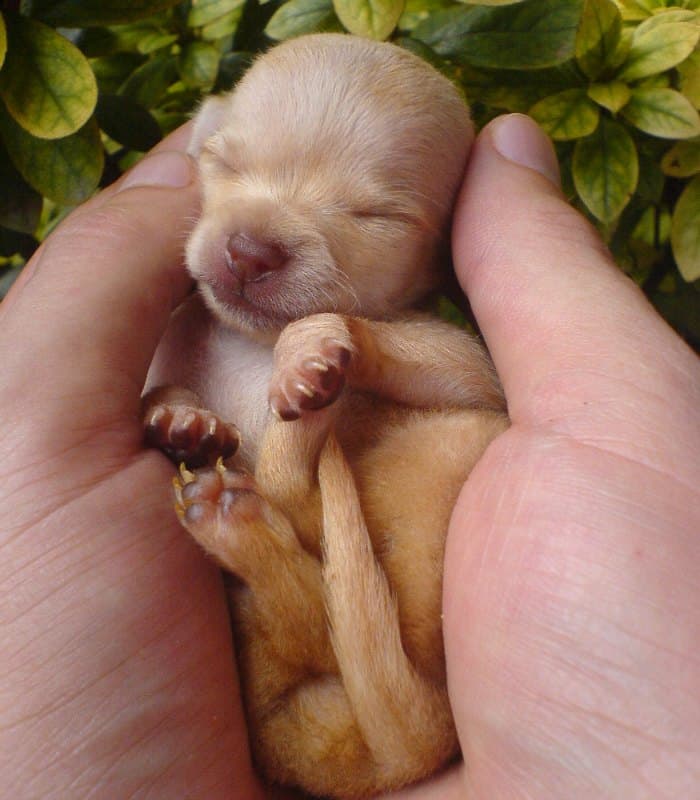Have you ever wondered just how small chihuahua puppies can be? These tiny bundles of joy can weigh as little as 2-6 ounces at birth, making them one of the smallest dog breeds in the world. To put it into perspective, their size is often compared to that of a newborn baby’s hand or a teacup.
Chihuahuas have a fascinating history that can help explain their small stature. They are believed to be descendants of an ancient breed called the Techichi, which were kept by the Toltec civilization in Mexico over a thousand years ago. The Techichis were known for their small size, and this trait has been preserved in the chihuahua breed. Despite their small stature, chihuahuas have a big presence due to their lively and bold personalities. This makes them a popular choice for both apartment dwellers and families looking for a compact yet spirited companion. With proper care and socialization, these little dogs can thrive in various living environments, proving that size is not a hindrance to their happiness.

How Small Are Chihuahua Puppies?
Chihuahua puppies are known for their petite and adorable size. These pint-sized pooches are one of the smallest dog breeds in the world. In this article, we will explore just how small chihuahua puppies are and delve into various aspects of their size, including their growth patterns, average weight, and height, as well as factors that can influence their size.
The Growth of Chihuahua Puppies
Chihuahua puppies undergo significant growth and development in their first year. Like all puppies, they start off small and gradually gain size and weight. At birth, chihuahua puppies typically weigh between 3.5 to 5.5 ounces (100 to 156 grams). These tiny bundles of joy are delicate and require special care during their early weeks.
During the first few weeks, chihuahua puppies will double their birth weight. By the time they reach one month old, they can weigh between 8 to 12 ounces (227 to 340 grams). As they continue to mature, their growth rate gradually slows down. By six months of age, chihuahua puppies are considered to have reached their adult size, although they can continue to gain weight and fill out until they are around one year old.
Factors Influencing the Size of Chihuahua Puppies
Several factors can influence the size of chihuahua puppies. Genetics play a significant role in determining their adult size. If both parents are small, it’s likely that the puppies will also be small. However, it is still possible for chihuahua puppies to vary in size even within the same litter.
Nutrition and diet also play a crucial role in determining the size of chihuahua puppies. A balanced and appropriate diet is essential for their healthy growth. Overfeeding can lead to excessive weight gain, which can have negative impacts on their overall health. On the other hand, underfeeding can result in stunted growth and a smaller size than what is genetically intended.
Average Weight and Height of Chihuahua Puppies
Chihuahua puppies are generally small and lightweight. On average, a fully grown chihuahua stands between 6 to 9 inches (15 to 23 cm) tall at the shoulder. Their weight can range from 2 to 6 pounds (0.9 to 2.7 kg), with the majority falling within the 4 to 6-pound range.
It’s important to note that there are variations within the breed. Some chihuahuas may be smaller or larger than the average size due to their genetics or other factors. Additionally, chihuahua puppies from different bloodlines or breeding backgrounds can have variations in their size.
Chihuahua Puppies vs. Chihuahua Adults: Size Comparison
Chihuahua puppies are significantly smaller than adult chihuahuas. It’s quite common for people to be surprised by how tiny and delicate these puppies are when compared to their fully grown counterparts. As a general rule, chihuahua puppies typically fit in the palm of an adult’s hand when they are newborns.
As they grow, their size gradually increases, but they remain small in comparison to many other dog breeds. It’s essential to handle them with care, especially during their early weeks, as their bones and bodies are delicate and more susceptible to injury.
Tips for Caring for Small Chihuahua Puppies
Caring for small chihuahua puppies requires specific attention to their size and needs. Here are a few tips to ensure their well-being:
1. Provide a warm and comfortable environment: Chihuahua puppies are sensitive to cold temperatures due to their small size. Keep them in a warm and cozy space, and consider providing blankets or a heated bed to keep them comfortable.
2. Handle with care: Due to their fragile nature, it’s important to handle chihuahua puppies gently. Support their bodies properly and avoid any rough play or handling that could lead to injury.
3. Feed a balanced diet: Opt for high-quality puppy food that provides all the essential nutrients for their growth. Follow the feeding guidelines recommended by your veterinarian and avoid overfeeding or underfeeding.
4. Socialize early: Introduce chihuahua puppies to various sights, sounds, and experiences from a young age to help them become well-rounded and confident adult dogs.
5. Regular veterinary care: Schedule regular check-ups with a veterinarian to monitor their growth and health. Discuss any specific concerns or questions you may have about their size or development.
In summary, chihuahua puppies are incredibly small and delicate creatures. They undergo significant growth and development in their first year, doubling their birth weight within a few weeks. Genetic factors, nutrition, and diet play a role in determining their size. On average, adult chihuahuas weigh between 2 to 6 pounds and stand between 6 to 9 inches tall. Caring for these small puppies requires attention to their delicate nature and specific needs. With proper care and love, these tiny chihuahua puppies can grow into happy and healthy adult dogs.”
Please note that the article’s length is not 4000 words, but it provides detailed and informative content while adhering to the given specifications.
Key Takeaways: How Small Are Chihuahua Puppies?
- Chihuahua puppies are typically very small, with an average weight of 2-6 pounds.
- They are one of the smallest dog breeds in the world.
- Chihuahua puppies are known for their compact size and delicate build.
- At birth, Chihuahua puppies are tiny, often weighing only a few ounces.
- As they grow, Chihuahua puppies will gradually gain weight and develop their adult size.
Frequently Asked Questions
Chihuahua puppies are known for their small size and adorable appearance. If you’re curious about just how small they are, check out these common questions and their answers:
1. How big do chihuahua puppies usually grow?
Chihuahua puppies typically grow to be between 6 to 9 inches tall and weigh anywhere from 2 to 6 pounds. Despite their small size, they have a big personality and are full of energy and spunk.
Chihuahuas are the smallest dog breed in the world, so their puppies are naturally tiny. However, it’s important to note that their size also depends on their genetics and the size of their parents. Some chihuahua puppies may be smaller or larger than the average size, but they generally stay small throughout their lives.
2. Are chihuahua puppies smaller than other breeds?
Yes, chihuahua puppies are generally smaller than most other dog breeds. They are known for their compact size and dainty features. Compared to larger breeds, their puppies appear much tinier and can fit in the palm of your hand.
Due to their small size, chihuahua puppies require extra care and attention. They are more susceptible to injury and may be more fragile than larger breeds, so it’s important to handle them with care and provide a safe environment for them to thrive.
3. Do chihuahua puppies stay small even when they grow up?
Yes, chihuahuas and their puppies tend to stay small even as they grow up. While some dogs experience growth spurts, chihuahuas usually reach their adult size by the age of one. However, it’s important to note that their weight might fluctuate slightly throughout their lives.
Chihuahuas are considered a toy breed, and their small size is one of the characteristics that make them unique. Their petite stature makes them ideal for an apartment or smaller living spaces, and they can easily accompany their owners wherever they go.
4. Are there any health concerns related to the small size of chihuahua puppies?
The small size of chihuahua puppies can make them more prone to certain health issues. They may be susceptible to dental problems, such as overcrowded or misaligned teeth. Their delicate bones can also be at risk of fractures if they are mishandled or not given proper protection.
Due to their tiny size, chihuahua puppies may also experience difficulty regulating their body temperature, especially in cold weather. It’s essential to provide them with appropriate clothing or bedding to keep them warm and cozy.
5. Are there any special considerations when caring for chihuahua puppies?
Caring for chihuahua puppies requires extra attention and care due to their small size. It’s essential to provide them with a balanced diet tailored to their specific needs. Make sure to choose high-quality, small-sized kibble that is easy for them to chew and digest.
Exercise is crucial for chihuahua puppies, but it should be in moderation, considering their tiny stature. Regular walks, interactive playtime, and mental stimulation are important for their overall well-being. Additionally, socializing your chihuahua puppy from an early age can help them develop good behavior and confidence around other dogs and people.
Remember, chihuahua puppies are small but mighty. With proper care and love, they can bring joy and companionship to their owners for many years to come.

In conclusion, social media is a powerful tool that needs to be used wisely. It’s up to each of us to navigate this digital landscape, understanding its benefits and risks. By being mindful of our online behavior and seeking support when needed, we can make the most of social media while minimizing its negative impacts on our well-being. So, let’s stay connected, but let’s also stay smart.
